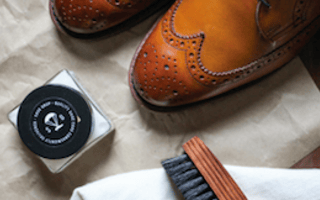[ibimage==48554==Large==none==self==null]
Entrepreneurs who claim they’ve got the next money-making concept are about as common as an old shoe. But a surplus of old shoes is exactly what one Chicago startup is hoping for.
Meet Shoe Drop, the tech-enabled shoe care and repair company busy rehabilitating and revitalizing the cobbler industry. As trends in retail shift to artisan, handmade quality goods, Shoe Drop hopes to sexify the industry and become the go-to choice for professional shoe care.
The team at Shoe Drop has already set up shop in offices, dry cleaners, and high-rise residences across the city. Their new app has been pushed to the Apple store and is currently in queue for launch.
From outdated to onsite and online
Shoe Drop was born from the minds of founders Brandon Labrum and Duncan Davis, shoe aficionados who were frustrated at the lack of accessibility for shoe care. After looking at competitors, Davis said there just weren’t any viable, tech-enabled options available for shoe care.
After working out some backend logistics, they started building a network with local businesses. The bootstrapped company has already established 40 drop-off locations and say they add between 10 and 15 new locations each week. That list includes about 25 companies where they provide on-site services, including giants like Salesforce, Groupon, and LinkedIn. And those numbers are growing fast.
Once the app launches, they expect that number to explode. Customers will be able to access Shoe Drop’s locations even more efficiently and they’ll be able to see the nearest drop-off, as well be able to categorize shoes by style, color, and material. Users can also specify what type of repair they’d like done. As soon as the shoes are finished, customers will be sent push notification. They’ve simplified the process and added transparent pricing — a welcome addition to the traditional cobbler experience.
“We set out to create a better way to treat shoes. We centered around something convenient, highly accessible, modern, and ultimately tech enabled. That’s the crux of our business model,” Labrum said.
Cobbler talent and startup ecosystem make Chicago a perfect fit
The team at Shoe Drop identified Chicago as the best-suited city to launch and perfect their business model. If successful, they intend to expand in New York, San Francisco, Boston, Philadelphia, among others.
According to Nina Foley, Shoe Drop’s VP of marketing, Chicago made sense because of the high quality of local talent for positions across the board.
Shoe drop is vertically integrated and is committed to hiring the best shiners and cobblers Chicago has to offer, ensuring the highest level of quality and care. This vertical integration also helps provide a home for craftsman who are a part of a dying industry. Shoe drop has already brought on five senior, experienced cobblers as full-time employees.
“A lot of guys don’t view us as competitors, but instead as a revolution,” Labrum said.
“With Shoe Drop, there’s still very much a human aspect,” said Foley. “The cobbler industry is special. It’s not only old, but it’s generational. Some of our workers have inherited the business from their fathers, who in turn got it from their own. To remove that human element would be a huge loss.”
It’s not just the cobbler industry that Shoe Drop thinks is special. “It’s an exciting time in Chicago,” Foley said. “It’s such a hotbed for startups, and it’s really nice to not just be a part of a team and a company that’s passionate providing a service, but also a city that’s passionate about growing and developing and being innovative, too.”
Davis agreed, adding that the Chicago startup scene is built around building for profitability—which he thought isn’t always the case for cities like New York or San Francisco.
Shoe Drop: it’s good for the sole
Besides its interest in supporting the bleeding cobbler industry, Shoe Drop is committed to a number of other civic initiatives to help give back to the community.
Plans include partnering with an organization that will take in shoes that can’t be repaired to Shoe Drop’s high level of quality. Those shoes will then be redistributed and put on the feet of people who wouldn’t otherwise have access to protective footwear.
In addition, the company has explored ways to get young people trained as skilled artisans—like cobblers—in order to develop a marketable skill if college is out of the question. What’s more, Shoe Drop is working hard to make sure professional women also have access to shoe care.
“We’ve been very intentional about bringing women into the conversation,” said Foley, who added that the cobbler industry is traditionally a very male-dominated world, even though shoe care for women is a monster of a market.
At the end of the day, the team said it’s about not neglecting an important part of how you present yourself. “We think shoe care and repair is a last bastion of our everyday wardrobes—it’s often just forgotten about,” said Labrum. “You see people walking around in nice clothes, nice dresses, nice suits, and then shoes they’ve often paid a lot of money for that are beat to hell.”
Have a tip for us or know of a company that deserves coverage? Email us via [email protected]






